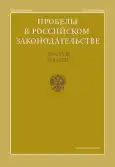Modern Terrorism as a Real Threat to Society and the State
- Authors: Tokbaev A.A.1
-
Affiliations:
- North Caucasus Institute for Advanced Studies (branch) of the Krasnodar University of the Ministry of Internal Affairs of Russia
- Issue: Vol 17, No 4 (2024)
- Pages: 141-145
- Section: General theoretical, criminal-legal and other problems of Countering extremism and terrorism. Problems of preventing extremism and terrorism
- URL: https://journal-vniispk.ru/2072-3164/article/view/265255
- EDN: https://elibrary.ru/IGQRCN
- ID: 265255
Cite item
Abstract
The author analyze modern interpretations of the concept of terrorism and derive its classification. The concept of “terrorism” is studied from the point of view of Russian legislation. The reasons for the widespread spread of terrorism in the world are explored. The author provide ways to counter the spread of international terrorism and offer their own ways to eradicate it. The author pay special attention to the historical stages of the development of terrorism in the Russian Federation, which makes it possible to determine the characteristic features of modern terrorism. Various concepts of terrorism are presented from the perspective of legal, hysterical and philosophical approaches. Terrorism remains a pressing problem in the world community, and forms of terrorism are also changing. This is confirmed by the terrorist attack on the Crocus City Hall concert hall on March 22, 2024 in Krasnogorsk. Terrorism is an extremely destructive phenomenon in modern society; it requires increased attention from the state, law enforcement agencies and public associations. One of the features of modern terrorism is a clear organizational structure in terrorist organizations, which significantly complicates counteraction by law enforcement agencies. If earlier terrorism was individual in nature, now it is well-organized associations that function according to a clear algorithm. The goals of terrorists have also changed; their actions are increasingly aimed at destabilizing state power in specific countries and establishing their own order. Terrorism in modern society simultaneously pursues several goals: psychological impact on the population: impact on government agencies; destruction of socio-economic stability. The goals of terrorist associations are becoming more and more ambitious; terrorist acts are mainly aimed at destroying the state system, i.e. pose a direct threat to national security. Accordingly, the functioning of terrorist organizations is impossible without funding; the authors also discuss this problem in the article. The identified features of terrorism currently make it possible to determine measures to prevent and counter terrorism, which include a whole range of measures, the implementation of which is the task of government and law enforcement agencies, public institutions and educational institutions.
Full Text
##article.viewOnOriginalSite##About the authors
Ayub A. Tokbaev
North Caucasus Institute for Advanced Studies (branch) of the Krasnodar University of the Ministry of Internal Affairs of Russia
Author for correspondence.
Email: Hamelion13@mail.ru
SPIN-code: 5720-8917
Cand.Sci. (Tech.), senior lecturer of the department of activities of internal affairs bodies in special conditions
Russian Federation, NalchikReferences
- Belsky V. Yu. Terrorism as a socio-political phenomenon and forms of its manifestation.// Countering extremism and terrorism philosophical, sociological and political aspects: proceedings of the all-Russian scientific-practical conference (November 14, 2014) Krasnodar, 2014.
- Tengizov F. A. international terrorism and weapons of mass destruction.// Gaps in Russian legislation.2014. Pp. 223-224.
- Esters, S. A., Terrorism: psychological roots and legal assessment. // State and law. 1995. No. 4. Pp. 20-42.
- Criminal code of the Russian Federation of 13 June 1996 № 63-FZ.// Meeting of the legislation of the Russian Federation from June 17, 1996, No. 25, article 2954.
- Federal law No. 35-FZ of 6 March 2006 on counteraction to terrorism.// Meeting of the legislation of March 13, 200 № 11. p. 1146.
- Tkachenko A. G. Terrorism spiritual and moral aspect /modern terrorism: state and prospects. M., 2000. p. 139-149.
- Zatolokin A. A. To the question about the nature of terrorism.// Bulletin of the Krasnodar University of the Ministry of internal Affairs.2015. No. 1. p. 31-34.
- Sobolev V. A. the sources of international terrorism and the possibility of counteraction at the modern stage // Bulletin of the Interparliamentary Assembly. St. Petersburg, 2001. No. 2. P. 163 — 164.
- Rybakov V. to the question of terrorism, or two sides of the same coin// World economy and international relations. — 2002. — No. 3. P.50-52.
- Khlobustov O. mass media and violence in society//Vlast. — 1999. — No. 10. P/ 25-28.
Supplementary files








